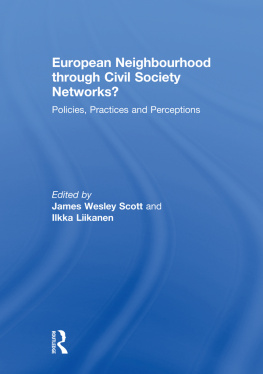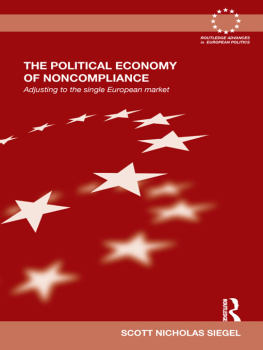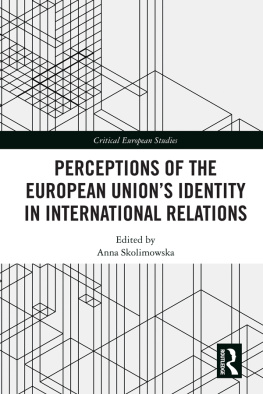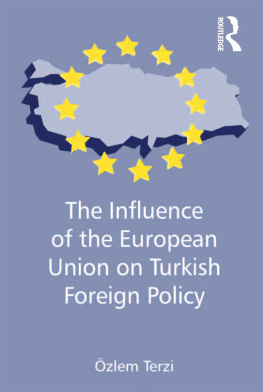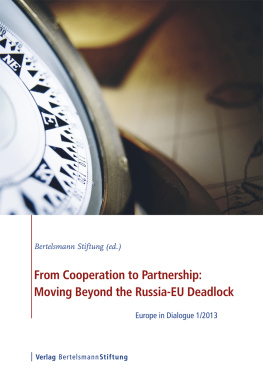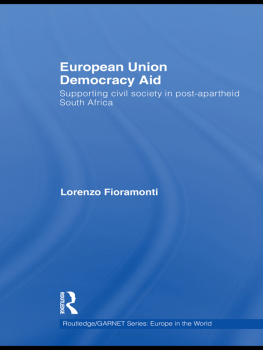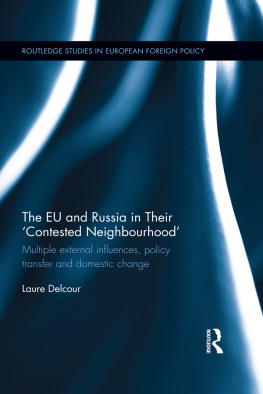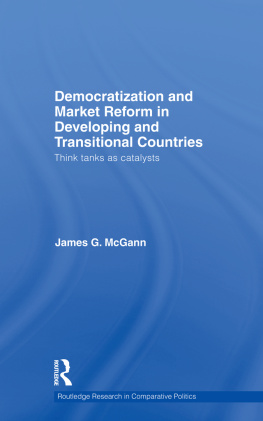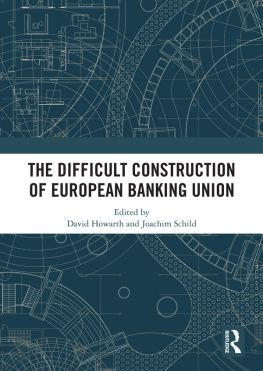European Neighbourhood through Civil Society Networks?
This book has a dual objective: on the one hand, it focuses on the actual and potential roles of civil society in developing new forms of political, economic, and socio-cultural cooperation between the European Union and its neighbours. On the other hand, through this investigation of civil society networks, it contributes to debate on the EUs role as promoter of greater regional co-operation.
The rationale for this collection is thus defined by changing political relationships between the 27-member European Union and countries in its immediate vicinity. These transformations include the ongoing but by no means straightforward process of Turkeys EU membership, an evolving (and complex) partnership with Russia and the development of deeper political, economic and social relationships with many other neighbouring countries. More specifically, the work presented here involves comparative studies of how the EU is perceived by civil society actors both within and outside the EU. We ask whether the EUs promotion of cross-border co-operation (e.g. though the European Neighbourhood Policy) is empowering civil society within member states and in neighbouring countries such as Russia, Moldova, Turkey and Morocco.
This book was based on a special issue of Journal of European Integration.
James Wesley Scott is a Professor at the Karelian Institute, University of Eastern Finland.
Ilkka Liikanen is a Professor at the Karelian Institute, University of Eastern Finland.
European Neighbourhood through Civil Society Networks?
Policies, Practices and Perceptions
Edited by
James Wesley Scott and Ilkka Liikanen
First published 2011
by Routledge
2 Park Square, Milton Park, Abingdon, Oxon, OX14 4RN
Simultaneously published in the USA and Canada
by Routledge
711 Third Avenue, New York, NY 10017
Routledge is an imprint of the Taylor & Francis Group, an informa business
2011 Taylor & Francis
This book is a reproduction of the Journal of European Integration, vol. 32, issue 5. The Publisher requests to those authors who may be citing this book to state, also, the bibliographical details of the special issue on which the book was based.
All rights reserved. No part of this book may be reprinted or reproduced or utilised in any form or by any electronic, mechanical, or other means, now known or hereafter invented, including photocopying and recording, or in any information storage or retrieval system, without permission in writing from the publishers.
Trademark notice: Product or corporate names may be trademarks or registered trademarks, and are used only for identification and explanation without intent to infringe.
British Library Cataloguing in Publication Data
A catalogue record for this book is available from the British Library
ISBN13: 978-0-415-58719-8
Disclaimer
The publisher would like to make readers aware that the chapters in this book are referred to as articles as they had been in the special issue. The publisher accepts responsibility for any inconsistencies that may have arisen in the course of preparing this volume for print.
James Wesley Scott*,** & Ilkka Liikanen*
*Karelian Institute, University of Eastern Finland, Joensuu, Finland
**Leibniz-lnstitute for Regional Development and Structural Planning, Germany
ABSTRACT This collaborative study pursues a dual objective. On the one hand, it focuses on the actual and potential roles of civil society in developing new forms of political, economic and socio-cultural cooperation within the emerging European Neighbourhood. On the other hand, through this investigation of civil society networks it contributes to the Europeanization debate with regard to the influence of the EU in civil society development in neighbouring states and on cross-border civil society interaction within the neighbourhood context. This will include a comparative analysis of perceptions of the EU and its role in empowering civil society as related by civil society actors. The rationale for this collection of essays is thus defined by the transformation of political relationships between the 27-member European Union and countries in its immediate vicinity. Based on research funded by the European Unions 6th Framework Programme, the authors will perform this investigation by analysing cooperation processes, the multilevel contexts within which they operate and, perhaps most importantly, the role of the EU in conditioning civil society relationships within the Neighbourhood.
Introduction
With the historic enlargements of 2004 and the admission of Bulgaria and Romania in 2007, the European Union has extended its borders eastwards and southwards. The EU is now a direct neighbour of Ukraine, Belarus and Moldova and has strengthened its presence in the Mediterranean and Black Sea regions. As a result, the EU has embarked on a large-scale effort to look beyond its internal borders and to engage neighbouring states in a new process of regional cooperation. To an extent, the emergence of a European Neighbourhood Policy (ENP) represents an alternative strategy to outright membership for third countries, such as Ukraine and Moldova. However, as a process of regional cooperation, the Neighbourhood entails much more than this; it signals a potential move away from traditional centre-periphery relationships towards a new form of regionalism based on the recognition of mutual interdependence (Browning and Joenniemi 2008; Scott 2005). In addition, the EU has suggested that co-ownership of cooperation policies will allow all participating states to share equally in the benefits of greater economic, political and socio-cultural cooperation (Balfour 2009).
Understandings of Neighbourhood are not strictly defined by specific policies (such as the ENP) but can also be interpreted in terms of a political, cultural and socio-economic space where the EU exerts transformative power beyond its borders. The very norms, values and acquis that define EU-Europe (e.g. the virtues of cooperation, democratic ownership, social capital and general values such as sustainability, solidarity and cohesion) are thus being advanced as a basis for common values and a sense of political community. The EU has also insisted that its regional cooperation agendas are not only about high politics in the traditional sense but also encompass social and cultural issues.
The concept of Europeanization is complex and has many different connotations.1 It has often been used in conjunction with the EUs post-1989 enlargement in which formal conditions for EU membership established mechanisms of institutional and social convergence to EU norms. Based on an understanding of Europeanization as a process through which EU values, norms and policy concerns are diffused beyond its borders (see Jones and Clark 2008), we can interpret the ENP as a policy instrument that aims to profoundly influence political and social interaction between the EU and its regional neighbourhood.
One of the more striking elements of the EUs emerging politics of regional cooperation is the actual and potential roles attributed to civil society. Civil society is understood as a political force central to the development of a wider community of values and societal goals; it is seen to have a modernizing and democratizing function within state-society relations. Civil society is also assumed to be a major political forum for the articulation within and beyond the state of social agendas and the promotion of human rights. In practical terms, civil society actor networks are rapidly developing between different communities of interest, often through concrete projects between the EU and neighbouring states. And, indeed, new and multifarious civil society networks are emerging between EU member states and neighbouring countries as diverse as Russia, Ukraine, Moldova, Turkey and Morocco.

